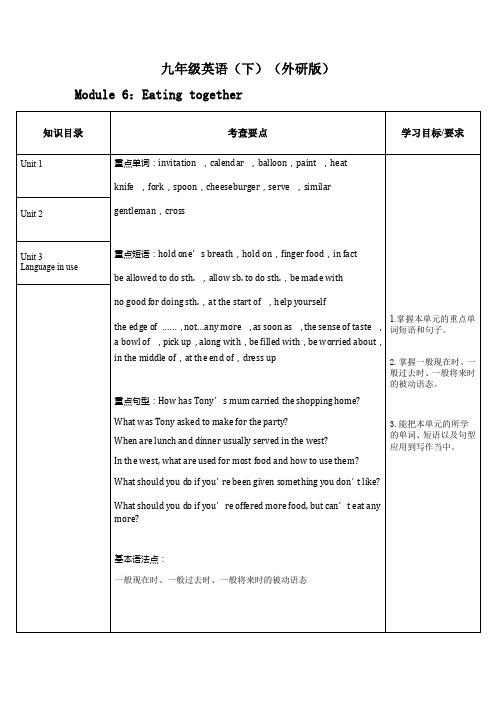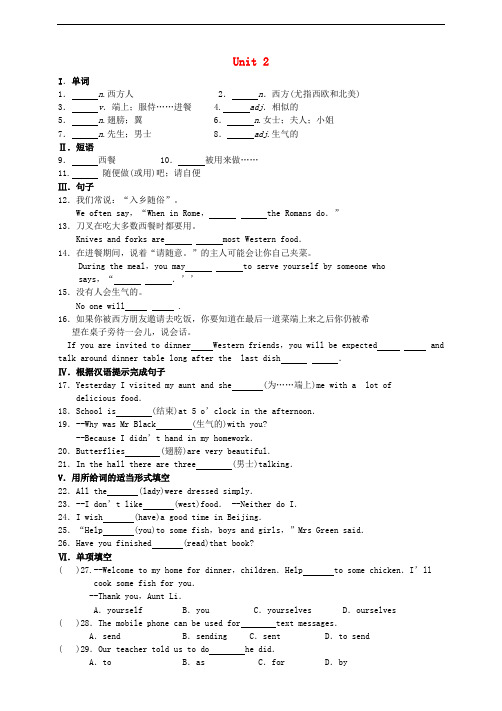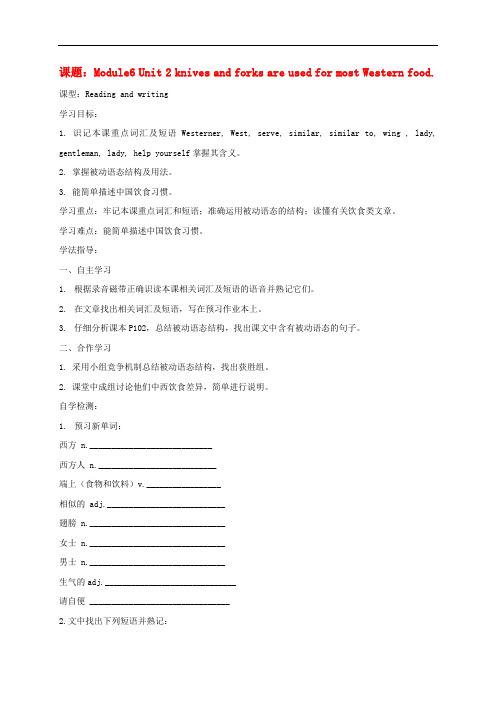(2019-2020)【重点资料】新九年级英语下册 Module 6 Eating together词句精讲精练(含解析)(新版)外研
九年级英语下 Module 6

九年级英语(下)(外研版)Module 6:Eating together·【易错题举例】【例1】:1.Our plan to clean the park tomorrow. (16海南)A. discussB. will discussC. will be discussed【答案】C【解析】试题分析:句意:明天我们讨论打扫公园的计划。
根据时间状语tomorrow可知,句子的时态为一般将来时态;plan与discuss之间是被动的关系,故句子运用一般将来时态的被动语态,答案为C。
【例2】:2.Each year quite a lot of food __ around the world. It’s really time for us to do something.A.was wastedB.is wastedC.wastedD.will be wasted【答案】B【解析】试题分析:句意:每年世界上都有很多食物被浪费。
真的该到我们做一些事情的时候了。
此题考查被动语态be+动词过去分词形式。
根据时间状语,句子用一般现在时态,故应选B。
【例3】:3.It’s reported that more th an one person ____ Best Actress in the 53rd Golden Horse Awards.A.are presented B. were presentedC. is presentedD. presents【答案】C【解析】试题分析:句意:据报道不止一个人被颁发了第53届金马奖最佳女演员奖。
根据主谓一致,more than one限制谓语动词使用单数形式,结合句意,此处需要使用被动语态。
故选C。
·【相似练习】【练习1】:4.--What a clean and bright school,isn’t it !--Yes, it’s always clean and bright ,because it _____ every day.A.cleanB.cleanedC.is cleanedD.cleans【答案】C【解析】试题分析:句意:- 多么干净明亮的学校,不是吗!-是的,它总是干净明亮的,因为它每天都被打扫。
外研版九年级英语下册全册教案:Module 6 Eating together 教案

Module 6 Eating together【教材分析】Module 6的主要内容为通过对中西方饮食文化的介绍来复习被动语态,重点学习heat up, be similar to, help yourself等短语的用法。
从全书来看,本模块承接上册书对被动语态的学习和运用,内容有层次的展开,学生容易接受。
Unit 1 When is the school-leavers’ party?【教学目标】●Knowledge objective1.Words:invitation,calendar,balloon,paint,heat,knife,fork,spoon,cheeseburger, Italian2. Expressions: heat up●Ability objective能听懂和阅读关于介绍学校毕业生聚会的语言材料,能通过相关词汇和图片描述聚会的情况;能编写关于毕业聚会的对话。
●Moral objective能够积极参加同学之间的庆祝活动;能够与同伴积极合作,参与课堂活动,大胆实践;能分享同学之间共同庆祝的快乐。
【教学难点】短语heat up和 be invited to do sth.的使用。
【教学方法】PWP method, task-based method and interactive approach【教学手段】A tape recorder, multimedia and some pictures【教学过程】Teaching Procedures:Step 1 Lead-inSs look the pictures and answer the questions.Is this an invitation?Have you ever been invited to the party?What will you take to join the party?What do you usually do at the party?Step 2 Consolidate new words and expressionLook and say. The teachers shows the pictures of new words and expressions, then let the students to say as quickly as possible.invitation n. 邀请;请柬calendar n.日历;历书balloon n.气球paint v. 绘画heat v. 使变热;给……加热knife n. 餐刀;刀具fork n. 餐叉spoon n. 匙;勺子cheeseburger n. 干酪汉堡包Italian adj.意大利的;意大利人的n. 意大利语;意大利人heat up 使变热;给……加热Step 3 Listening1.Listen and complete the invitation.InvitationYou are invited to the _______________ on Saturday, 30th May at ____________ in ________________________________. Bring a traditional dish (____________). Come and enjoy the food, music and dancing. 2.Now work in pairs and check.Step 4 Listening1. Listen to Part 2 and answer the following questions.1) What is Daming going to make?Jiaozi.2) Who is going to make hot and sour soup?Lingling.Step 5 Reading1.Read the dialogue and complete the notes.DishLingling ___________________Betty ___________________Daming ___________________Tony ___________________Made with …Lingling _______________________Betty ________________________Daming ________________________Tony ________________________2.Read the dialogue and answer the questions.1. What was Daming chosen to do at the school-leavers’ party?2. Where are they going to prepare the food?3. Why does Tony call pizza a traditional English dish?Step 6 Complete the passage with the words in the box1. Read the passage carefully.2. Choose the right words in the box.3. Draw the right answers from each group.balloons calendar forkknife paint spoonThe day for the school-leavers’ party is an important date in the school (1) _________. Tony is going to bring some (2) _________ and(3)______________ some pictures for the party. Everyone is going tobring a traditional dish that can be eaten with their fingers. Soup is no good because it is not finger food and people need a (4) _______ for it. Anything that needs a (5) _______ and (6) _______ is not finger food either.Step 7 Everyday EnglishLet Ss say what they have learnt in the passage.•Soup’s no good then.•And you?•I see what you mean.Step 8 Language pointsSs should master the main points from the passage in Part 3.If possible, let the students to say at first.1. Look at the school calendar!看看学校的校历!calendar表示“日历”,school calendar表示“校历”。
外研版九下英语Module6Eeatingtogether知识精讲

Module 6 Eeating togetherM o d u l e6单词invitation [ˈɪnvɪˈteɪʃn] n. 邀请;请柬calendar [\\\\\\\\\\\'kælɪndə] n. 日历;历书balloon [bəˈlu:n] n. 气球paint [peɪnt] v. 绘画heat [hi:t] v. 使变热;给……加热heat up使变热;给……加热knife [naɪf] n. 餐刀;刀具fork [fɔ:k] n. 餐叉spoon [spu:n] n. 匙;勺子cheeseburger [\\\\\\\\\\\'tʃi:zbɜ:ɡə] n. 干酪汉堡包Italian [ɪ\\\\\\\\\\\'tælɪən] adj. 意大利的;意大利语的;意大利人的;n.意大利语;意大利人Western [ˈwestən] n.西方人West [west] n. 西方serve [sɜ:v] v.端上(食物和饮料);服侍……进餐similar [ˈsɪmələ] adj. 相似的wing[wɪŋ] n. 翅膀;翼lady [ˈleɪdi]n. 女士;夫人;小姐gentleman [ˈdʒentlmən] n. 先生;男士help yourself 随便做(或用)吧;请自便cross [krɒs] adj. 生气的U n i t1课文(录音+动画+翻译)Lingling: When is the school -leavers ’ party?Betty:Look at the school calendar! It’ll be held onthe30th of May . We’re all invited.Daming: In fact, I was chosen to play the dance music. Tony: And I was asked to bring some balloons and paint some pictures for the party.Betty: The teachers have asked everyone to prepare a traditional dish from their home country.Lingling: Can we cook it at school?Betty: We can heat it up in the school kitchen, but it should be cooked at home. What are you going to make? Lingling: Hot and sour soup. It’s made with chicken and vegetables.Betty: But the invitation says finger food! That means you eat it with your fingers, not with a knife, fork or spoon.Lingling: Oh, soup’s no good then. What about you?Betty: Cheeseburgers. Cheeseburgers are made with hamburgers and cheese.Tony: And you, Daming?Daming: Jiaozi ! My grandmother makes the best jiaozi ! Betty: Is she invited to the school-leavers ’ party too? Daming: Hmm, I see what you mean. What about you, Tony? Tony: A traditional English pizza with cheese, tomatoand ham.Betty: Pizza isn’t English! It’s Italian!Tony: But it’s eaten everywhere in Englan d.Daming:It’s becom ing popular in China too!玲玲:毕业派对什么时候举行?贝蒂:看看校历吧! 5月30日举行。
九年级下Module6 Eating together重点知识梳理(教师版)

九下Module6模块重点知识复习清单Ⅰ.精要词汇1、邀请、请柬invitation2、日历、历书calendar3、气球balloon4、绘画paint5、使受热heat6、餐叉fork7、勺子spoon8、意大利的Italian 9、西方人Westerner10、西方West11、服侍......进餐serve12、相似的similar13、翅膀wing14、先生gentleman15、女士lady16、生气的crossⅠ.精要短语1、使加热heat up2、请自便help yourself3、事实上;实际上in fact4、要求某人去做某事ask sb. to do sth.5、准备做某事prepare to do sth.6、用…做成be made with7、与……相似be similar to8、主动提出做某事offer to do sth.9、一……就as soon as10、穿上盛装;乔装打扮dress upⅠ.重点句型1、我们常说:“入乡随俗”。
We often say, “When in Rome, do as the Romans do.”2、他的生日宴会将在这个周末举行。
His birthday party will be held this weekend.3、很多学生被选去参加那个英语演讲比赛。
Many students were chosen to take part in the English speaking competition.4、已经通知每个人都要准备好一些故事书。
Everyone has been told to prepare some story books.5、有些学校允许学生带手机。
The students are allowed to take mobile phones in some schools.6、当你不知道该怎么办时,请参照玛丽的做法。
九年级英语下册 Module 6 Eating together Unit 2 Knives and

Unit 2I.单词1.n.西方人 2.n.西方(尤指西欧和北美)3.v.端上;服侍……进餐 4. adj.相似的5.n.翅膀;翼 6.n.女士;夫人;小姐7.n.先生;男士 8.adj.生气的Ⅱ.短语9.西餐 10.被用来做……11. 随便做(或用)吧;请自便Ⅲ.句子12.我们常说:“入乡随俗”。
We often say,“When in Rome, the Romans do.”13.刀叉在吃大多数西餐时都要用。
Knives and forks are most Western food.14.在进餐期间,说着“请随意。
”的主人可能会让你自己夹菜。
During the meal,you may to serve yourself by someone whosays,“.’’15.没有人会生气的。
No one will .16.如果你被西方朋友邀请去吃饭,你要知道在最后一道菜端上来之后你仍被希望在桌子旁待一会儿,说会话。
If you are invited to dinner Western friends,you will be expected and talk around dinner table long after the last dish .Ⅳ.根据汉语提示完成句子17.Yesterday I visited my aunt and she (为……端上)me with a lot ofdelicious food.18.School is (结束)at 5 o’clock in the afternoon.19.--Why was Mr Black (生气的)with you?--Because I didn’t hand in my ho mework.20.Butterflies (翅膀)are very beautiful.21.In the hall there are three (男士)talking.V.用所给词的适当形式填空22.All the (lady)were dressed simply.23.--I don’t like (west)food. --Neither do I.24.I wish (have)a good time in Beijing.25.“Help (you)to some fish,boys and girls,”Mrs Green said.26.Have you finished (read)that book?Ⅵ.单项填空( )27.--Welcome to my home for dinner,children.Help to some chicken.I’llcook some fish for you.--Thank you,Aunt Li.A.yourself B.you C.yourselves D.ourselves( )28.The mobile phone can be used for text messages.A.send B.sending C.sent D.to send( )29.Our teacher told us to do he did.A.to B.as C.for D.by( )30.I’ll tell him the news as soon as he back.A.comes B.will come C.come D.has come( )31.My mother will be if I spend too much time watching TV.She thinks it’s bad for my eyes.A.happy B.cross C.excited D.comfortableⅦ.根据汉语意思完成句子32.这项工作将于明年年初开始。
九年级英语下册Module6EatingtogetherUnit2Knivesandforksare

课题:Module6 Unit 2 knives and forks are used for most Western food. 课型:Reading and writing学习目标:1. 识记本课重点词汇及短语Westerner, West, serve, similar, similar to, wing , lady, gentleman, lady, help yourself掌握其含义。
2. 掌握被动语态结构及用法。
3. 能简单描述中国饮食习惯。
学习重点:牢记本课重点词汇和短语;准确运用被动语态的结构;读懂有关饮食类文章。
学习难点:能简单描述中国饮食习惯。
学法指导:一、自主学习1.根据录音磁带正确识读本课相关词汇及短语的语音并熟记它们。
2.在文章找出相关词汇及短语,写在预习作业本上。
3.仔细分析课本P102,总结被动语态结构,找出课文中含有被动语态的句子。
二、合作学习1. 采用小组竞争机制总结被动语态结构,找出获胜组。
2. 课堂中成组讨论他们中西饮食差异,简单进行说明。
自学检测:1.预习新单词:西方 n.____________________________西方人 n.___________________________端上(食物和饮料)v._________________相似的 adj.___________________________翅膀 n._______________________________女士 n._______________________________男士 n._______________________________生气的adj.______________________________请自便 ________________________________2.文中找出下列短语并熟记:①入乡随俗_____②了解______ ______ ______ ______ ______③ 在…开始时_ ________④ 被邀请做某事__ ______ _________________⑤ 被用来做某事_ ______ __________________⑥ 比如⑦不再 _____ ______ _____________⑧ 在…结束时 _________________________⑨. 期待做某事_____ ________⑩. 提供某物给某人_ _ ________3.本文中含有被动语态的句子:__________________________________________________________________________ _________________________________________________________________________ 合作探究经过讨论我们能简单描述中西方饮食习惯的差异。
2019-2020学年九年级英语下册Module6Eatingtogether词句精讲精练含解析新版外研版
Module 6 Eating together词句精讲精练词汇精讲1.inviteinvite是及物动词,意为“邀请”,常用于下列结构:(1)invite sb.邀请某人例如:Do you invite the friends in Beijing?你邀请北京的朋友了吗?(2)invite sb. to some place邀请某人去某地例如:Why don’t you invite them to our school?为什么不邀请他们来我们学校?(3)invite sb. to dinner邀请某人吃饭例如:Li Lin often invites me to dinner.李林经常邀请我吃饭。
(4)invite sb. to do sth.邀请某人做某事例如:We invited our parents to come to our party.我们邀请我们的父母来参加聚会。
2. meanmean是动词,有如下用法:(1)表示“意思是,指的是”,后接名词、动词不定式或句子。
例如:The red l ight means“stop”.红灯意思是“停止”。
Do you mean that I am too heavy?你的意思是我太胖了?(2)表示“打算,意欲”,后面常接不定式。
例如:He means to do it well.他打算把这件事做好。
(3)表示“意味着……”,后面常接动名词作宾语。
例如:Missing the train means waiting for another one hour.赶不上这列火车意味着再等一小时。
(4) What does…mean? = What’s the meaning of…?= What do you mean by…?意为“……是什么意思?”3. serveserve有“服侍,侍候,招待”等意思,常用于以下结构中:(1) serve+宾语例如:They were busy serving the day’s last buyers.他们正忙着接待这天的最后一批顾客。
外研版英语九年级下册Module 6 Eating together知识点总结
Module 6♦重点词汇1.invitation n.邀请;请柬invite v.邀请be invited to 被邀请去……invite sb.to do sth.邀请某人做某事2.calendar n.日历;历书3.balloon n.气球4.paint v.绘画5.heat v.使变热;给……加热heat up使变热;给……加热6.knife n.(pl.knives)餐刀;刀具7.fork n.餐叉8.spoon n.匙;勺子9.Italian adj.意大利的;意大利语的;意大利人的n.意大利语;意大利人Italy n.意大利10.Westerner n.西方人West n.西方(尤指西欧和欧美)Western adj.西方的11.serve v.端上(食物和饮料);服侍……进餐12.similar adj.相似的be similar to 与……相似13.wing n.翅膀;翼dy n.女士;夫人;小姐15.gentleman n.先生;男士16.cross adj.生气的17.the school⁃leavers’ party 毕业生晚会18.a traditional dish一道传统菜肴19.be made with...由……制成(看得出原材料)20.no good不适合it is no good doing sth.做某事没用no good for sth.不适合某物/某事no good to sb.对某人没有好处/帮助do no good没用处,不成功21.take chance to抓住机会22.in the West在西方23.help yourself随便做(或用)吧;请自便24.eating customs饮食习俗25.pick up搭载;拿起;拾起26.put on穿上27.be filled with充满……28.join in加入,参加29.practise doing sth.练习做某事30.dress up盛装打扮♦重点句型1.The teachers have asked everyone to prepare a traditional dish from their home country.老师让每个人准备一道自己国家的传统菜肴。
九年级英语下册 Module 6 Eating together Unit 1 When’s the
music. Tony: And I was asked to bring some balloons
and paint some pictures for the party.
Dish
Made with …
hot and sour
Lingling soup
chicken and vegetables
Betty cheeseburgers hamburgers and cheese
Daming
Jiaozi
Not mentioned in the passage
Tony
pizza
cheese, tomato and ham
19
balloons calendar fork knife paint spoon
The day for the school-leavers’ party is an important date in the school _c_a_le_n_d_a_r__. Tony is going to bring some __b_a_ll_o_o_n_s_ and ___p_a_i_n_t__ some pictures for the party. Everyone is going to bring a traditional dish that can be eaten with their fingers. Soup is no good because it is not finger food and people need a ___s_p_o_o_n__ for it. Anything that needs a _k__n_if_e_/f_o_r_k_ and _f_o_r_k_/k_n_i_f_e is not finger food either.
九年级英语下册 Module 6 Eating together Unit 3 Language i
课题:Module6 Unit 3 Language in use课型:Revision and application学习目标:1. 熟练使用本模块重点词汇和短语。
2. 掌握被动语态结构及用法。
3. 能简单描述自己的一次特殊饮食经历。
学习重点:牢记本模块重点词汇和短语;准确运用被动语态的结构。
学习难点:能简单描述自己的一次特殊饮食经历。
学法指导:一、自主学习1.复习本模块重点词汇和短语。
2.找出本单元含有被动语态的句子,写在预习作业本上。
二、合作学习1. 采用小组竞争机制总结被动语态结构,找出获胜组。
2. 小组讨论中西方饮食差异,简单汇报自己的一次饮食经历。
三、自学检测:1.根据首字母或汉语提示完成单词。
1). There is some food which can be e with your fingers.2). Thank you for your i________. I must go if I am free.3). Who is the o of the big house?4).You can use your fingers to eat chicken w_______.5). When you can’t see, your s of taste will improve.6). Ladies and g________, welcome to the ceremony.7). If you want to improve your spoken English, you should practise (说) itas much as possible .8). Pass me the s______, please . I want to have the soup.9). She is not French, she is I_________.10). The little boy cut it with the k_______.2、完成句子。
- 1、下载文档前请自行甄别文档内容的完整性,平台不提供额外的编辑、内容补充、找答案等附加服务。
- 2、"仅部分预览"的文档,不可在线预览部分如存在完整性等问题,可反馈申请退款(可完整预览的文档不适用该条件!)。
- 3、如文档侵犯您的权益,请联系客服反馈,我们会尽快为您处理(人工客服工作时间:9:00-18:30)。
Module 6 Eating together词句精讲精练词汇精讲1.inviteinvite是及物动词,意为“邀请”,常用于下列结构:(1)invite sb. 邀请某人例如:Do you invite the friends in Beijing? 你邀请北京的朋友了吗?(2)invite sb. to some place邀请某人去某地例如:Why don’t you invite them to our school?为什么不邀请他们来我们学校?(3)invite sb. to dinner邀请某人吃饭例如:Li Lin often invites me to dinner. 李林经常邀请我吃饭。
(4)invite sb. to do sth. 邀请某人做某事例如:We invited our parents to come to our party. 我们邀请我们的父母来参加聚会。
2. meanmean是动词,有如下用法:(1) 表示“意思是,指的是”,后接名词、动词不定式或句子。
例如:The red light means “stop”. 红灯意思是“停止”。
Do you mean that I am too heavy? 你的意思是我太胖了?(2)表示“打算,意欲”,后面常接不定式。
例如:He means to do it well. 他打算把这件事做好。
(3) 表示“意味着……”,后面常接动名词作宾语。
例如:Missing the train means waiting for another one hour.赶不上这列火车意味着再等一小时。
(4) What does…mean? = What’s the meaning of…?= What do you mean by…?意为“……是什么意思?”3. serveserve 有“服侍,侍候,招待”等意思,常用于以下结构中:(1) serve+宾语例如:They were busy serving the day’s last buyers.他们正忙着接待这天的最后一批顾客。
(2) serve sb. sth.或serve sth. to sb. 例如:Mrs. Turner served us a very good dinner.=Mrs. Turner served a very good dinner to us.特纳太太招待我们吃了一顿丰盛的晚餐。
(3) serve sb. with sth. 例如:We served them with beer and wine. 我们用啤酒和红酒招待他们。
【拓展】serve的名词是service,意为“服务,效劳”。
例如:He died in the service of his country. 他为国捐躯。
There is a good bus service into the city.往市内的公共汽车十分方便。
4. holdhold 是动词,意为“举行,举办,召开”,常可以用have来替换,过去式和过去分词均为held。
例如:hold a meeting举行会议hold a concert举行音乐会hold a sports meeting举行运动会【拓展】hold的其他含义:5. be used forbe used for 意思是“被用来做某事”,for是介词,它的后面用名词或者动名词作宾语。
例如:Knives are used for cutting things. 刀是用来切割东西的。
【拓展】use构成的其他的短语有:(1)be used as意思是“被作为……使用”,as是介词,意思是“作为”,它强调被当作工具或者手段来使用。
例如:Our classroom is used as a reading-room.我们的教室被用来当阅览室使用。
(2)be used by意思是“被……使用”,by后面跟人或者物,表示强调动作的使用者。
例如:This radio is often used by my mother.这台收音机经常被我的妈妈使用。
(3)be used to do something意思是“被用来做某事”,和be used for doing是同义词短语。
例如:It is used for learning English.=It is used to learn English. 它被用来学习英语的。
(4) be used to doing something的意思是“习惯于做某事”。
例如:My father is used to living in the village. 我的爸爸习惯于住在乡村。
6. howeverhowever意为“然而”,不能直接连接两个分句,必须另起新句,并用逗号隔开。
例如:It was raining hard. However, we went out to look for the boy.雨下得很大,不过我们还是出去寻找那个孩子。
【拓展】(1)but是并列连词,连接两个并列分句,后面不用逗号,前后句在总的意义上构成了对比。
例如:I really don’t like cheese, but I will try just a little this time.我实在是不喜欢吃奶酪,但是这次我要尝一点。
(2)however比but用的场合更正式, 因此however用于书面语,而but 常用于口语。
另外, however 的意思还不只局限于“但是;然而”,它还有其他的用法。
例如:However hard I worked, she was never satisfied.无论我多么努力地工作,她从来没满意过。
However did you get here without a car?没有汽车你究竟是怎样来的呢?7. offeroffer是动词,意为“拿出,提供;(主动)提出要做某事”。
常用于“offer sb. sth. = offer sth.to sb.向某人提供某物”和“offer to do sth.主动去做某事”这两种结构。
例如:I offered him a lot of food. 我给他许多食物。
He offered to take her to the cinema. 他提出带她去看电影。
【拓展】offer的同义词为provide,常用结构是provide sb. with sth. 和provide sth. for sb. 意为“向某人提供某物”。
例如:Somehow she managed to provide her children with food and clothing.她总设法使她的孩子有饭吃,有衣穿。
8. similarsimilar作形容词,意为“相似的”。
be similar to…意为“与……相似,接近”,一般用在相近似的物品和情境的对比上。
例如:His problem is similar to yours. 他的问题和你的相似。
I guess it may be similar to the Hindu culture. 我猜想,这可能接近于印度文化。
【拓展】(1)look like意为“看起来像……” 。
应用范围最广,除了描述人、物之外,也能抽象表达事件或现象。
例如:He looks like a famous movie star. 他看起来像一个电影明星。
It looks like it’s going to rain soon. 天看起来要下雨。
(2)take after 最常见的是用在有血缘关系的亲子之间,外貌用的最多,也能够用在性格脾气这些内在特质上。
例如:She took after her mother almost in everything. 她几乎与她母亲一模一样。
Adam was my grandfather and I took after him. 亚当是我的祖父,我和他很相像。
词汇精练I. 英汉互译。
1. 事实上_____________________2. be used for _____________________3. hold a sports meeting_____________________4. 入乡随俗_____________________5. 例如_____________________6. school-leavers’party_____________________7. too much food _____________________ 8. 主动去做某事_____________________9.heat up ____________ 10. 请自便 _______________II. 根据句意及汉语或首字母提示完成单词。
1.Dumpling are Chinese t_________ food.2. The soup t_________ sweet. Would you like some?3.Thanks for your i________. I’m sure to attend your birthday party.4. I’ve heard that the o________ of the supermarket is a young man.5. K_______ are used for cutting things.6.The old _________(谚语)“the early bird gets the worm”is my favorite.7. Winter is o_____________. Spring is coming.8. She _________(提供) him a lift and he accepted(it).9. Here’s some a_____________ for you about learning English.10. Dinner is ________(服务,提供) around 7pm or even later.III. 用所给单词的适当形式填空(注意被动语态的正确使用)。
1. This book can _____________(use) as a textbook.2. These beds _____________(make) of wood.3. English _____________(speak) in Canada.4. The old man was quite weak after the accident, so he must _____________(look) after.5. They know salt _____________(produce) in many places.6. My homework _____________(finish) in two hours.7. We don’t know when the school _____________(fou nd).8. The trees _____________(not water) last week.参考答案I. 英汉互译。
